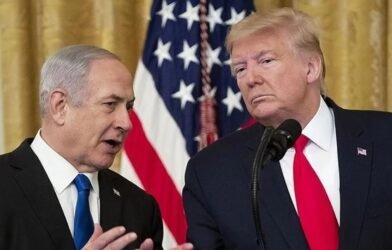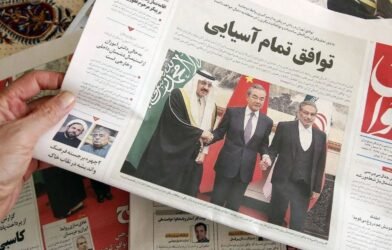Subtotal $0.00
During the Negev summit at the end of March, which brought together the foreign ministers of Egypt, the UAE, Bahrain, and the United States, it was notable that Egyptian Foreign Minister Sameh Shoukry, unlike his colleagues, had a grim expression on his face, which was evident in the photo taken of them holding hands as a sign of solidarity.
Cairo considers itself the leader of the Arab world, so it is not pleased that the Israeli side is taking the initiative to play this role, which it considers one of its most important rights and privileges. The Egyptian peace was a peace aimed at paying Israel's harms of constant attrition through wars and to satisfy the largest power in the world (the United States), not to empower it from the neck of the region, and therefore it was always a cold peace.
On the other hand, the UAE and Bahraini peace aims to benefit from Israel's military power in confronting Iran, in addition to its presence with the US administration and its ability to influence the US decision related to the Middle East in favor of these countries, so they are interested in a warmer relationship than that of Egypt.
Israelis have been talking about the Iranian nuclear threat since the early 1990s, and to this day we have seen no trace of this alleged threat in reality, while Israel is widely believed to be the only nuclear-armed country in the Middle East.
Israel has succeeded before in sabotaging the US-led international nuclear deal with Iran, yet Iranian power has not diminished. On the contrary, the US blockade of Iran has put US allies who depend on Iranian oil in economic hardship, and Israel is once again trying to put sticks in the wheels as it sees the nuclear deal with Iran just around the corner.
Israel is trying to play on all cords as always, and we have seen how it followed a slippery policy in the recent Russian-Ukrainian confrontation, trying not to anger either the United States, Russia or Ukraine. It also knows that the biggest threat from the American point of view is the Chinese threat, not the Russian one, yet it follows the same approach in its relationship with China.
The alleged interests between Israel and the Gulf states are certainly not economic interests, as these countries, especially the UAE, have the economic capacity that makes them indifferent to the investments and money expected to be made from Israel. Rather, they are security interests first and foremost, because these countries sense the decline of American interest in the region, and their fear of the rise of the American security umbrella, which is why we have witnessed a shift in their policy towards both China and Russia, which has become warmer recently, and here we understand how and why these countries are meeting with Israel. What unites these parties is the same sense of concern about a region that is not under American protection, dominated by large regional states such as Iran, while we do not find the same concern in Egypt, which has clearly expressed this position.
While the leaders of the three countries chose to focus on the Iranian threat, al-Masri chose to dissent and emphasize that his interests are not necessarily aligned with those of Israel, the UAE, and Bahrain, so he emphasized that he did not come to build alliances against anyone.
With the exception of Egypt, Syria and Lebanon have never had a relationship with Israel, but Jordan, which has the longest border with Israel, and the Palestinian Authority, which has a direct relationship with Israel, were noticeably absent from the meeting. In fact, in the words of Prime Minister Mohammed Shtayyeh, the PA sharply criticized the Arab countries participating in the summit.
Since the beginning of the Arab-Israeli conflict, Egypt has tried to make itself the exclusive gateway to the Palestinian issue and has fought for this with the Palestinian factions themselves and neighboring countries, and it sees this file as one of the important cards left in its hand in light of its declining influence in Africa and the region.
So why did Sameh Shoukry come to the meeting despite all these considerations?
It can be said that the regime of President Abdel Fattah al-Sisi has overcome the crisis of legitimacy that faced him at the beginning of his rule, and his opponents from the Muslim Brotherhood and other revolutionary forces are almost a memory of the past, but the first challenge today before the Egyptian state is the challenge of development and economic prosperity that Sisi has long promised the Egyptian people, and despite the remarkable achievements made by the Sisi regime in the field of roads and infrastructure, the Egyptian economy is still a fragile economy that needs foreign support, usually coming from Gulf countries.
The period of the coronavirus pandemic was harsh on many economies, and the military confrontation in Ukraine came to make matters worse. The energy and food bill rose significantly, which affected the price of the Egyptian pound, so the Gulf countries, led by Saudi Arabia and the UAE, took the initiative to support the Egyptian economy with deposits and buying shares of some Egyptian companies, in a situation of this kind that could hit stability in Egypt, the Egyptian conservative position towards Israel and the nature of the distribution of roles in the region usually tolerate this kind of maneuver mixed with resentment.
There is no doubt that the Gulf and Israelis realize that Egypt is not incapable of repositioning itself at any time and reshuffling the many cards in its hands, especially the relationship with Turkey, which has great ambitions in the Eastern Mediterranean that could easily converge with Egyptian interests.
So can Israel rely on the Gulf and Moroccan role, or is the right address still in Egypt and Turkey? The Israelis must know exactly what is going on at the regional and local level, and that the redistribution of roles can happen at any time and will most likely not be in their favor, but they seem to believe that they still have some time before the tightrope walking game is over.












